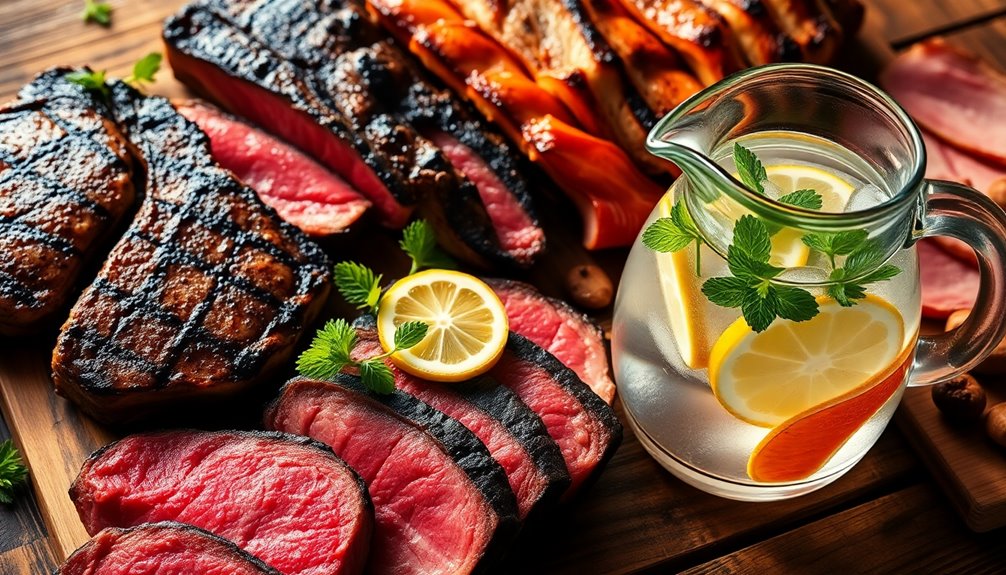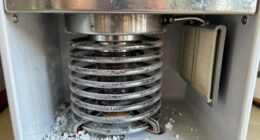Staying hydrated on the carnivore diet is crucial since you're missing out on water-rich plant foods. Aim for 2-3 liters of water daily to offset increased protein metabolism. Don't forget about electrolytes—add sea salt to your meals and consider incorporating bone broth for hydration and essential minerals. Monitor your urine color; light yellow indicates good hydration, while dark yellow suggests you need to drink more. Also, listen to your thirst cues and track your intake. For more insights on optimizing your hydration routine, you won't want to miss the tips and tricks that follow!
Key Takeaways
- Aim for 2-3 liters of water daily to counteract protein-induced water loss on the carnivore diet.
- Incorporate bone broth to provide hydration and essential electrolytes like sodium and potassium.
- Monitor your urine color; light yellow indicates good hydration, while dark yellow signals a need for more fluids.
- Recognize thirst as a natural cue for hydration needs and respond promptly to avoid dehydration.
- Enhance meals with sea salt to maintain electrolyte balance, especially on low-carb diets.
Importance of Hydration

Staying properly hydrated is essential when you're following a carnivore diet. Since you're cutting out water-rich plant foods, you'll need to consciously drink water to avoid dehydration symptoms like dry mouth and dizziness. The higher protein intake on the Carnivore Diet increases protein metabolism, which leads to greater water loss. That's why monitoring your hydration levels regularly is imperative.
Drinking adequate water not only helps regulate your body temperature but also supports kidney function and aids in nutrient absorption, which is especially important with a high-protein diet.
Keep an eye out for signs of dehydration, such as dark urine and lethargy, as these can indicate that you're not drinking enough.
While thirst is a natural cue for when to drink water, remember that your individual hydration needs can vary based on factors like your activity level and climate. It's fundamental to listen to your body's signals.
Make it a habit to drink water throughout the day, ensuring you stay hydrated and feel your best while following the Carnivore Diet.
Understanding Electrolyte Balance

Electrolyte balance is essential for your health, especially on a carnivore diet. Electrolytes like sodium, potassium, magnesium, and calcium play significant roles in maintaining fluid balance, muscle contractions, and nerve signaling.
On this diet, your primary sources of electrolytes come from meat, sea salt, and bone broth, so it's important to include these foods to prevent deficiencies.
With the low carbohydrate intake typical of the carnivore diet, your body can struggle to retain sodium and other electrolytes. This might mean you need to increase your salt intake to support hydration and overall health.
Monitoring your hydration status is important, particularly during fasting periods, as an inadequate electrolyte balance can lead to symptoms like muscle cramps, fatigue, and dizziness.
To meet the recommended dietary allowances (RDA) for electrolytes, especially during intense physical activity or high protein intake, consider supplementation. Additionally, integrating state-specific retirement benefits into your financial planning can help ensure you have the resources to maintain your health and hydration needs in retirement.
Aim for a balanced intake of electrolytes per day to support your body's needs. By understanding and managing your electrolyte balance, you can enhance your hydration and overall well-being on the carnivore diet.
Hydration Strategies for Carnivores

To stay properly hydrated on the carnivore diet, you should aim for at least 2-3 liters of water each day.
You can also boost your hydration with bone broth, which provides essential electrolytes.
Keep an eye on your urine color and adjust your salt intake to help maintain fluid balance.
Daily Water Intake
Adequate daily water intake is essential on the carnivore diet, as the absence of water-rich foods makes conscious hydration necessary. Without fruits and vegetables, you need to pay special attention to your hydration levels to support kidney function and avoid symptoms like dark urine and dizziness.
A good rule of thumb is to aim for at least half your body weight in ounces of water each day. You might need to adjust this based on your activity level and the climate you're in. Monitoring your urine color is a practical way to gauge your hydration. Light yellow indicates you're well-hydrated, while dark yellow suggests you need to drink more.
Don't forget that thirst is a natural indicator of your hydration needs. Listen to your body and increase your water intake during intense activity.
Additionally, incorporating bone broth into your diet can enhance hydration and provide essential electrolytes, which are important for fluid balance on a high-protein diet.
Electrolyte Balancing Techniques
Maintaining the right balance of electrolytes is essential on the carnivore diet, as the high protein intake can lead to imbalances that affect your overall health. One effective strategy is to consume bone broth regularly, which is rich in sodium, potassium, and magnesium. This not only helps replenish electrolytes but also supports fluid balance. Additionally, understanding the potential side effects of dehydration can motivate you to prioritize your fluid intake. Sleep can play a crucial role in your overall hydration and recovery, as aligning with desired realities may help you maintain better health. It is also important to discuss personal risk factors with a healthcare provider, especially if experiencing unusual symptoms. Individuals with certain mental health conditions, such as Borderline Personality Disorder, may experience increased sensitivity to dehydration and electrolyte imbalances, affecting their emotional regulation.
Don't forget to add sea salt to your meals; it can enhance hydration and improve muscle function and energy levels, especially on low-carb diets like yours. Monitoring your urine color is a practical way to gauge your hydration status. Aim for light yellow, while darker shades might suggest you need more fluids and electrolytes.
If you experience muscle cramps or fatigue, consider supplementing with potassium and magnesium. These minerals can help mitigate imbalances caused by high protein consumption. Additionally, incorporating anti-inflammatory herbs such as turmeric may support overall joint health and reduce any discomfort from dietary changes.
Finally, aim for a daily sodium intake of about 3,000-5,000 mg to counteract potential electrolyte losses and support hydration. By incorporating these techniques, you'll maintain a healthier electrolyte balance, keeping you energized and hydrated on your carnivore journey.
Common Hydration Misconceptions

Many people hold misconceptions about hydration that can impact their health, especially on a carnivore diet. One common belief is that there's a universal water intake requirement. In reality, your hydration needs depend on factors like your activity level, climate, and personal health. It's essential to listen to your body rather than adhering to rigid guidelines.
Another misconception is that drinking excessive amounts of water is always beneficial. Overhydration can lead to electrolyte imbalances, such as hyponatremia, which can be dangerous. Thirst is often dismissed, but it's a natural signal that should guide your water consumption. Ignoring it can result in inadequate hydration.
Additionally, some suggest high water intake regardless of diet type, overlooking that low-carb diets like the carnivore diet may require increased sodium to maintain fluid balance. Misunderstandings about hydration can lead to fatigue and muscle cramps.
Instead of following generalized advice, focus on finding a personalized balance of water and electrolytes. By understanding these misconceptions, you can enhance your hydration strategy and overall well-being on the carnivore diet.
Practical Tips for Staying Hydrated

Staying hydrated on a carnivore diet can be straightforward if you keep a few practical tips in mind. Start by aiming to drink at least half your body weight in ounces of water daily. This is essential, especially since a high-protein diet can increase water loss through protein metabolism.
To help you track your hydration, here's a simple guide:
| Hydration Tip | Details |
|---|---|
| Monitor Urine Color | Pale yellow indicates good hydration. |
| Eat Electrolyte-Rich Foods | Incorporate bone broth and sea salt. |
| Listen to Your Thirst Signals | Drink before, during, and after workouts. |
| Adjust for Activity & Climate | Increase intake in hot weather or intense workouts. |
Pay attention to your body's signals and adjust your fluid intake accordingly. This will not only help you stay hydrated but also improve your performance and recovery on the carnivore diet. By following these practical tips, you'll maintain ideal hydration and enhance your overall well-being.
Monitoring Your Hydration Needs

To monitor your hydration needs effectively on a carnivore diet, pay close attention to your urine color—light yellow means you're hydrated, while dark urine signals dehydration.
Stay aware of your thirst cues, as they're essential for knowing when to drink water.
Aim for at least 2-3 liters of water daily, adjusting based on your activity level and environment.
Urine Color Indicator
Monitoring your urine color serves as a simple yet effective method to assess your hydration levels. Ideally, you want your urine to be a pale yellow, which indicates ideal hydration. Darker shades, like amber or dark yellow, signal that you need to increase your fluid intake. Dehydration can concentrate your urine, leading to those darker colors and often causing symptoms like dry mouth and dizziness.
As you go about your day, aim for that light yellow hue in your urine. Adjust your water intake based on factors such as your activity level, the climate, and how much protein you're consuming on your carnivore diet.
Regularly checking your urine color not only helps prevent dehydration-related complications but also fine-tunes your electrolyte balance. Proper hydration supports efficient nutrient absorption and waste elimination, which is especially important when you're on a high-protein diet.
Thirst Cues Awareness
Being attuned to your body's thirst cues is essential, especially on a high-protein carnivore diet where hydration needs can often be overlooked.
Thirst signals your body's need for fluids, and ignoring them can lead to dehydration, particularly as increased protein metabolism leads to greater water loss.
To effectively monitor your hydration needs, consider these strategies:
- Urine Color: Regularly check the color of your urine. Pale yellow indicates adequate hydration, while dark yellow means it's time to drink more water.
- Listen to Your Body: Pay attention to other dehydration symptoms like dry mouth, dizziness, or fatigue. These signs can indicate that you need to increase your fluid intake before it becomes critical.
- Personalize Your Needs: Understand that hydration needs vary based on activity level, climate, and dietary changes.
Don't stick to a fixed amount; adjust accordingly to keep yourself hydrated throughout the day.
Daily Water Intake
Staying hydrated on a carnivore diet requires a proactive approach to daily water intake. Since this diet lacks water-rich foods, you should aim for about 2 to 3 liters of water each day. Adjust this amount based on your activity level and the climate you're in.
Monitoring your urine color is an effective way to assess your hydration status. Pale yellow urine indicates proper hydration, while dark yellow means it's time to drink more water. As your protein intake increases on the carnivore diet, your need for water also rises to support kidney function and waste elimination. Regular hydration checks are essential.
While thirst is a natural indicator, don't rely solely on it, especially during intense physical activity or hot weather. If you notice symptoms of dehydration—like dry mouth, dizziness, or dark urine—boost your water intake immediately to stay healthy.
Frequently Asked Questions
How to Stay Hydrated While on a Carnivore Diet?
To stay hydrated on a carnivore diet, you need to consciously increase your water intake.
Pay attention to your urine color; aim for light yellow to guarantee you're adequately hydrated. Incorporate electrolyte-rich foods like meat, sea salt, and bone broth to maintain fluid balance.
If you notice symptoms of dehydration, such as dry mouth or dark urine, adjust your water intake immediately.
Also, tweak your salt intake based on your activity levels for peak hydration.
How Do You Get Enough Electrolytes on a Carnivore Diet?
Think of your body as a finely tuned orchestra, where electrolytes play the essential notes for harmony.
To get enough electrolytes on a carnivore diet, savor high-quality meats, fish, eggs, and organ meats.
Don't forget to sprinkle sea salt on your meals, as it's key for balance.
Enjoy nutrient-rich bone broth, and monitor your urine color—clear is good!
If needed, consider electrolyte supplements to keep your body in perfect tune.
What Is a Super Hydrating Food When You Are Thirsty?
When you're thirsty, bone broth's your best bet for super hydration. It's packed with water and essential electrolytes, making it an excellent choice.
Organ meats, especially liver, also help since they've higher water content and are nutrient-dense.
Don't forget fatty fish like salmon for hydration and omega-3s.
Eggs contribute too, providing moderate moisture while offering protein and fats.
Including these foods can keep you hydrated and energized throughout the day.
Why Do I Feel so Dehydrated on Carnivore?
You might feel dehydrated on the carnivore diet because you're consuming fewer water-rich foods, leading to increased water loss from higher protein intake.
This can strain your kidneys, making hydration essential for their function. Symptoms like dry mouth and dark urine signal you need to drink more.
Additionally, the low-carb nature of the diet can disrupt your electrolyte balance, which can also contribute to that dehydrated feeling.
Keep an eye on your hydration levels!
Conclusion
Staying hydrated on a carnivore diet is vital, just like keeping a fire fueled to maintain its warmth. By understanding your body's needs and balancing electrolytes, you can guarantee you're drinking enough water. Remember to listen to your body and incorporate hydration strategies that work for you. Don't let thirst sneak up on you—make hydration a priority. With these tips, you'll feel energized and ready to tackle your day with clarity and vigor!









